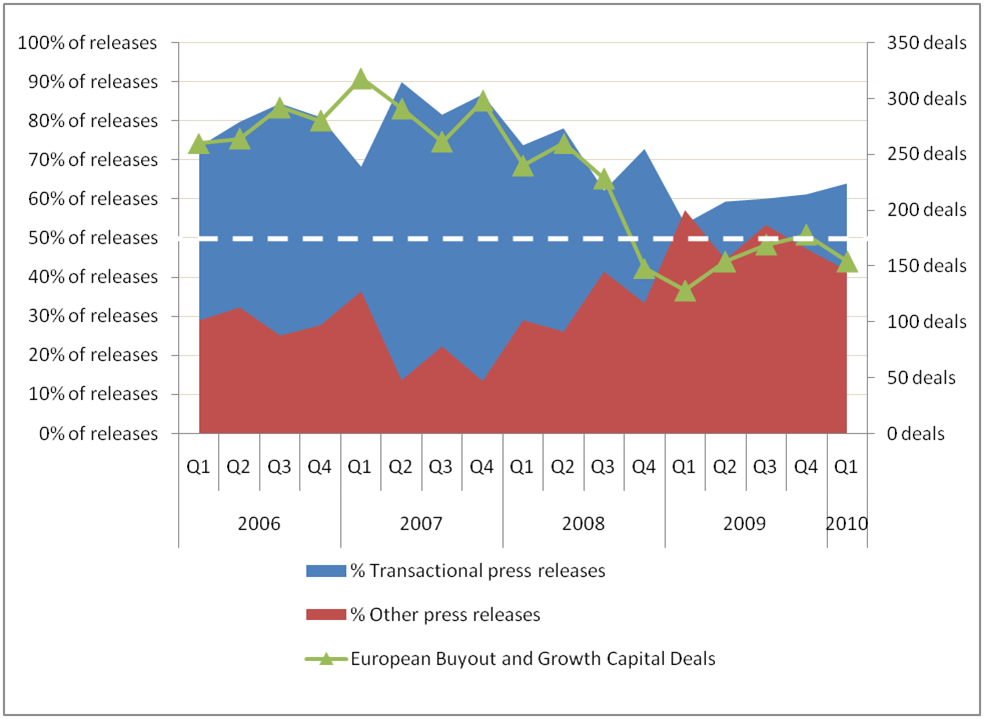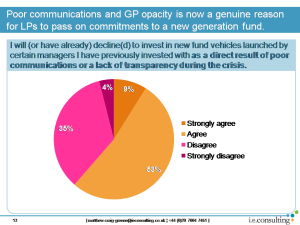Archive
Bain: Global private equity report 2010
[tweetmeme source=”mattcg” service=”bit.ly” only_single=”false”]
Bain & Company: “Global private equity report 2010” Bain briefs Publications.
I’ll provide some commentary when I get a chance to read it thoroughly. At first glance it looks very nicely laid out and is quite inviting for the reader, even if the corporate black and red is a little reminiscent of a casino table.
Leafing through it brings to mind the hilarious knockabout farce that was BCG and IESE’s 2008 offering The Advantage of Persistence: How the Best Private Equity Firms “Beat the Fade”, which you can read here.
It’s full of chioce tidbits that will leave you with aching sides and coffee on your monitor screen. AND it was co-authored by Heiko Meerkat.
But for those of you with a shorter attention span, how abut a quick look back to what McKinsey had to say about the buyout boom in 2007:
The recent tightening of credit markets has complicated the financing of some buyout deals and may dampen the flow of investor money into private equity firms. Skeptics on both sides of the Atlantic have been quick to proclaim that the private equity boom is over. But don’t expect private equity to suddenly fade to the background, as did the leveraged buyout boom of the 1980s. Even if growth slows in the short term, pension funds and other institutional investors will remain interested in private equity. McKinsey projects the industry’s assets under management may double by 2012, to $1.4 trillion.
Wow. AND “wow” again.
More than a big deal? What GPs think worth communicating
[tweetmeme source=”mattcg” service=”bit.ly” only_single=”false”]
Well, the IE Consulting team and I read through almost 700 press releases from European buyout and growth capital investors (2006-2010) so you don’t have to. And the results of our research are summarised in an article in this month’s Private Equity Europe:
I think GPs are so focussed on announcing their transactions that they are neglecting the opportunities they have to communicate everything else they – and their portfolio companies – do. But what do you think? Please let me know, below!
Life as a Limited Partner during the financial crisis – The Good, the Bad and the Ugly
[tweetmeme source=”mattcg” service=”bit.ly” only_single=”false”]
Earlier this month I had the honour and pleasure to be invited onto a panel at the 6th Annual Private Equity Forum at my alma mater. The panel sought to address how LPs had been affected by the financial crisis and, not being a Limited Partner myself, I thought it prudent to ask some, beforehand. If you were one of the 60 institutional investors into private equity that responded to my questionnaire, many thanks!
In any case, and as my colleagues predicted, there was no real need to call upon the research findings during the event. But some of the findings were so intriguing that I wanted to share them with you. I hope you find them as interesting as I did.
The link below will take you to a summary of the results.
Limited Partners in a New Era – the Good, the Bad, the Ugly
People prefer performance, and that will never change, but we found that many LPs had already ditched managers that they felt had not been communicating with them sufficiently well and some found that misalignment of interests between LP and GP (shock! horror! such DO exist!) had become more apparent during the crisis.
There’s much, much more in the full report, so I hope you will take the time to dive in. If you have any questions or comments, you know where to find me!
Open, for business… Private equity firms and transparency
[tweetmeme source=”mattcg” service=”bit.ly” only_single=”false”]
As promised, I’ve uploaded a pdf of the first article on IE Consulting’s new research into the way that GPs are communicating and how open they are to inbound communication. You can access it below:
This first installment looks at some of the absolute basics of open communication: How easy is it for an interested party (press, Limited Partner, intermediary, etc) to find contact details for individuals within the firm.
Sorry I couldn’t get it to embed properly!
“Open, for business?” full article on docstoc.com
The next piece in Private Equity Europe will lok at the thematic content of prtess releases from buyout investors in Europe since January 2006. And there will be more in the coming weeks, so watch this space…
How transparent are private equity fund managers really? What do you think?
[tweetmeme source=”mattcg” service=”bit.ly” only_single=”false”]Private equity fund managers have been under pressure in recent years to improve both the reporting they undertake to their institutional investors and the transparency with which they operate, in general. Government, regulators, the press, Limited Partners: they all want to know more about the activites of GPs. My colleagues and I at IE Consulting have spent some time looking at the press releases of the most active General Partners in Europe.
We looked at:
- The access provided to dealmakers and communications staff through their websites
- The thematic content of all press releases issued since January 2006
- The quantitative and qualitative content of all press releases pertaining to buyout investments issued in the last 12 months
Some of the results were surprising, some disappointing, some encouraging, and some downright astonishing.
The results will be published in Private Equity Europe and the first installment is out at the end of this week.
Of course, I’ll be uploading the information here, too!
In the meantime, I’m interested in your thoughts:
Should private equity firms be more transparent?
If so, are they trying hard enough?
And how successful are they being?
Perhaps you work at a GP in a marketing or communications or PR role or you are a journalist, regulator or LP. Either way, I am sure you have some interesting thoughts on this. Let me know in the comments!
Waste not, want not

How solid is it /
Selling gas to get liquid? /
Don’t get in a state!
Biffa is supposedly trying to transform into a company that turns waste into energy, so why sell a division that does just that? Maybe LPs need distributions…not that distributing money to LPs is necessarily a bad thing, of course!
Of course, landfill gas collection is only a viable business as long as there are landfills producing gas. Given that landfills are increasingly unpopular with government and the general public and that collection of gas is only really viable for 20 years or so from each site, this is a pretty smart way to return some cash to invetors with out too adversely affecting the resale price of the business.
Do buyouts need more bad PR? At least the PE house is not at fault here!
You can Bank on it:
Delist at that price? You’ll get
Shareholders iRate
Apax Partners (full disclosure – my team is owned by one of their portfolio companies…I like to think it’s Apax’s favourite one :)) is trying to buy Bankrate. And some share holders are not too happy at the purchase price. Apax is paying a premium, of course, but some shareholders are not convinced the premium is fair.
Rather than the concerns of the conflict of interests that may develop between a private equity owner and an incumbent management team (particularly if that management team intends to stick around after the PE house exits), it is the management team itself that may be questioned in this instance. Has the share price been artificially deflated (don’t say sabotaged!) in order to present a more attractive purchase price for the buyout house and the management team/the team’s equity in the new deal?
Frontier Capital – Learnin’s from the ol’ West

- Image via Wikipedia
Traditionally, the Venture Capital industry has taken its lead from the West. Sure there are fine firms up and down the US and beyond, but think of venture capital and it’s hard not to imagine Google’s garage or a sarcastic VC cutting through some poor entrepreneur’s far-fetched American dream (or, if it’s 1999, funding it).
Now that probes into the services that 3rd party marketing firms and placement agents offer are causing some concern, VCs need to wise-up on the marketing of their own funds. And it’s not going to be easy.
I’ve written before on certain similarities between the actions of some in the fundraising industry and of those in the Wild West. I wasn’t too complimentary, but I wonder what we can learn from the Ol’ West? Here are some quick pointers:
Firstly, if you can, it’s important to show some kind of track history. After all…
It’s better to be a has-been than a never-was.
But track history isn’t everything, of course; it might have been easy raising your last fund in ’06: You delivered 30%+ IRR and most of the LPs were reckoning on funding their commitments with distribution in any case. But, in 2009, if you can’t show how your teams delivered those returns, you’re sure gonna hear this an awful lot:
Timing has a lot to do with the outcome of a rain dance
And honesty really is the best policy; let’s hear it for bad news, told well. The amount of DD LPs are putting in these days means that it is going to be increasingly difficult to exercise that special sort of creativity that some VCs are rumoured to be indulging in with the valuations of some slightly wonky Chinese portfolio companies. Much better to open the books and tell the story of what happened and what was learned.
Good judgment comes from experience, and a lotta that comes from bad judgment.
Of course, one of the most important skills is getting an upfront read on who might be ready to commit and who is still waiting before making new commitments. It’s like they used to say:
Never slap a man who’s chewin’ tobacco.
So:
- Show what you have done
- Show how you did it
- Don’t just tell the good news
- Wait for the right time to tell it
If you get all that licked, you might stand half a chance!
I’ll tail off now..:
Never miss a good chance to shut up.
European Private Equity Survey – mid-market
If you’ve got 5-10 minutes spare and you work on European private equity transactions as either a deal exec, an origination specialist, or an advisor, please take this survey . We ran something similar last year and are looking to see how the market has changed.
The results, along with those of last year and a whole host of other goodies will be available free of charge to all respondents.
Thanks in advance!
Why should I invest in your fund?
I’ve been thinking recently how successful fundraisers stand out and I keep coming back to the importance of clarity and focus. If an LP is to invest, the following must be explicitly established:
- 1.This market represents a great opportunity, right now and for a considerable time;
- 2.This strategy is the most suited to exploiting that opportunity;
- 3.This manager is the most able to successfully execute that strategy.
I thought this was so central to the selection process that I even drew a diagram to illustrate it:
With legally required disclaimers the only exception, I believe these are the first three ideas an LP should see when opening any fundraising materials. These three concepts should inform the content throughout. And that includes the cover.



![Reblog this post [with Zemanta]](https://i0.wp.com/img.zemanta.com/reblog_e.png)




